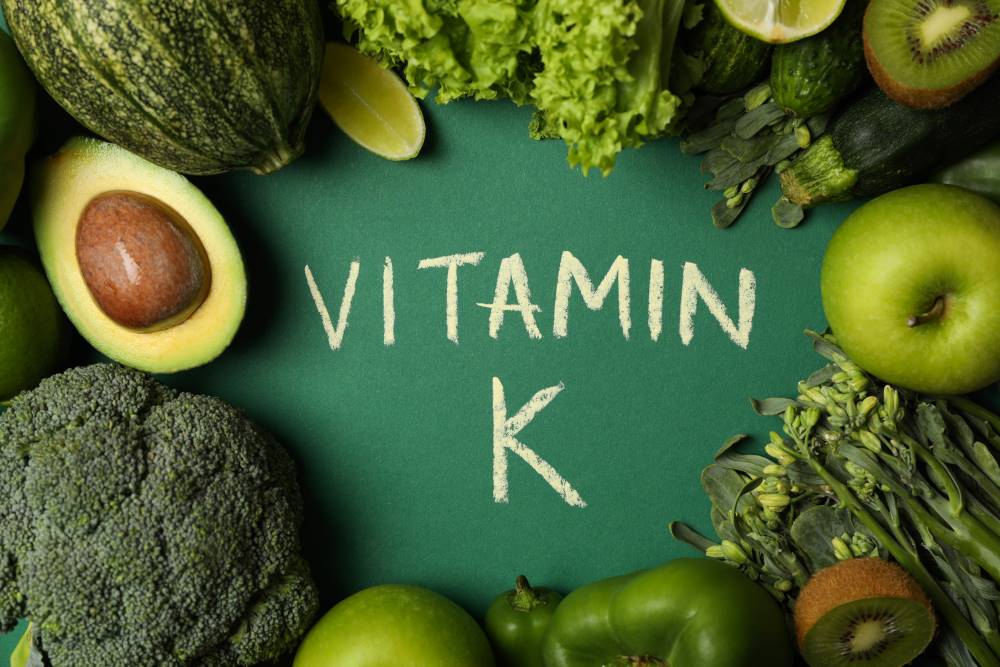19 Signs & Symptoms of Vitamin K Deficiency

Do you suffer from excessive bleeding? Does any cut or wound take longer to heal?
If yes, you are suffering from vitamin K deficiency. Vitamin K is a group of essential fat-soluble compounds that helps in clotting blood and absorbing calcium, affecting bone and heart health. So naturally, the lack of it affects concerned body parts and internal functioning.
Read along to learn more about vitamin K deficiency, the related symptoms, causes, and treatment

Table of Contents

What is Vitamin K Deficiency?
Vitamin K deficiency refers to a condition where both adults and newborns suffer from various symptoms like excessive bleeding, easy bruising, etc. This is because the body lacks the required protein that helps in coagulation (in layman’s terms, blood clotting).
Vitamin K is the main agent that helps the body produce prothrombin responsible for blood clotting. If an individual lacks vitamin K, the coagulation process cannot begin instantly. Hence, they suffer from excessive bleeding.
One must note that vitamin K inadequacy is rare in adults due to its presence in common dietary sources such as green leafy vegetables, grains and oils.
However, infants are at high risk of vitamin K insufficiency, which can further be triggered in the presence of several factors such as liver disease, malnutrition, and a side-effect of taking specific prescribed drugs.
Insufficient vitamin K does show certain symptoms. Let’s learn about them in detail.
How Common is Vitamin K Deficiency?
A vitamin K deficiency is uncommon because most adults have adequate nutrient levels due to appropriate gut bacteria and the fat in many widely consumed foods. Insufficient vitamin K in the body might cause more frequent bruises and bleeding than normal. A vitamin K shortage can be confirmed by blood testing.
19 Signs and Symptoms of Vitamin K Deficiency
Vitamin K deficiency symptoms differ in the case of adults and infants. These are separately discussed below:
Symptoms of vitamin K deficiency include
Vitamin K Deficiency Symptoms in Adults
Vitamin K Deficiency Symptoms in Infants
Now that you know what are the symptoms of vitamin k deficiency, let’s look at the various reasons that cause this deficiency.
Reasons Causing Vitamin K Deficiency
As stated earlier, deficiency of vitamin K is rare in healthy adults. Nonetheless, mentioned below are some of the vitamin K deficiency causes-
- If individuals take coumarin anticoagulants like warfarin, that acts as a blood thinner.
- If individuals rely on high doses of vitamin A and E.
- If individuals do not eat vitamin K enriched foods.
- If individuals take antibiotics that affect vitamin K production and absorption.
Apart from these, there are certain medical conditions that trigger vitamin K deficiency, such as malabsorption. In this particular condition, a body is unable to absorb fat in the required amount. Individuals with the following conditions are most likely to suffer from vitamin K insufficiency (fat malabsorption)-
- Cystic fibrosis
- Patients who underwent the intestine part removal like during Bariatric surgery
- A disorder in the biliary tract (liver, bile ducts and gallbladder) or intestines
- Celiac disease
Similar to the symptoms of vitamin K deficiency, the causes also vary in the case of newborns. These are discussed below-
- If infants get breast milk that is low in vitamin K.
- If the liver of a newly born baby cannot actively utilize vitamin K.
- If a baby receives insufficient vitamin K from the mother’s placenta.
- If newborns cannot produce vitamin K on their own during the initial days of their life.
After learning about the causes of vitamin K deficiency, the next area of focus includes vitamin K deficiency diseases. Read along!
Effects of Vitamin K Deficiency in Long Run
Adults suffering from vitamin K deficiency for a long time need to treat the condition timely. Long term ignorance can lead to excessive bleeding. However, vitamin K inadequacy is treatable in most cases.
On the other hand, in the case of infants, if intracranial haemorrhage lasts long or is left untreated, it can result in brain damage or even death.
Diagnosis of Vitamin K Deficiency
Diagnosing vitamin K deficiency typically involves a combination of clinical evaluation, laboratory tests, and sometimes imaging studies. Here are the methods commonly used
History and Physical Examination
Gathering information about dietary habits, medical history (especially any conditions affecting fat absorption), medications (like antibiotics that may interfere with vitamin K production), and symptoms such as easy bruising or excessive bleeding.
Physical Examination
Check for signs of bleeding tendencies such as petechiae (small red or purple spots on the skin), ecchymosis (larger bruises), or bleeding gums.
Prothrombin Time (PT) and International Normalised Ratio (INR)
These tests measure how long it takes for blood to clot and are used to assess the functional status of vitamin K-dependent clotting factors. Prolonged PT and INR suggest impaired clotting function due to vitamin K deficiency.
Activated Partial Thromboplastin Time (aPTT)
Similar to PT/INR, aPTT measures the clotting time but is sensitive to deficiencies in other clotting factors that are not dependent on vitamin K.
Factor Assays
Direct measurement of vitamin K-dependent clotting factors (such as Factor II, VII, IX, and X) can confirm their deficiency.
Serum Vitamin K Levels
Though less commonly used, measuring vitamin K levels directly in the blood can indicate deficiency if levels are low.
X-rays or Bone Scans
In severe vitamin K deficiency cases, imaging may reveal abnormalities such as osteopenia or fractures, which can occur due to impaired vitamin K's role in bone metabolism.
Liver Function Tests
Vitamin K metabolism involves the liver, so abnormalities in liver function tests may suggest underlying causes of deficiency.
Genetic Testing
Genetic testing may be considered in rare cases where there is suspicion of genetic causes of vitamin K deficiency (such as due to mutations in genes involved in vitamin K metabolism).
Diseases Caused by Deficiency of Vitamin K
To initiate the list of vitamin K deficiency diseases, let us know about vitamin K Deficiency Bleeding (VKDB). It refers to a condition where their body cannot stop bleeding due to insufficient vitamin K in the blood, which helps to form the clot.
Apart from this-
- Vitamin K deficiency leads to Osteoporosis.
- The lack of this nutrient can result in poor bone development.
- Insufficient vitamin K may end up in increased cardiovascular disease.
After knowing which disease is caused by a deficiency of vitamin K, it is time to move to the next section regarding the side effects of vitamin K deficiency.
Best Food Sources to Overcome Vitamin K Deficiency
A diet rich in vitamin K is the best way to overcome its deficiency. The following tables have numerous foods to choose from.
Fruits to Overcome Vitamin K Deficiency

Add any of the following fruits to your diet to overcome vitamin K deficiency.
Vegetables to Overcome Vitamin K Deficiency

Overcome vitamin K deficiency by including these vegetables that are rich in vitamin K.
Other Eatables to Overcome Vitamin K Deficiency

Add these food items into your diet and ensure an increase in the vitamin K quantity in your body.
Calculate Your Health Metrics Instantly
How Much Vitamin K Do You Need Daily?
Adults require about 1 microgram of vitamin K daily for every kilogram of body weight. For instance, a person weighing 65 kg would require 65 micrograms of vitamin K daily, whereas a person weighing 75 kg would require 75 micrograms.
Treatment for Vitamin K Deficiency
Treatment for vitamin K deficiency depends on the severity and underlying cause. Here are the typical approaches:
How to Prevent and Overcome Vitamin K Deficiency?
To prevent vitamin K deficiency, one can follow the given tips:
- Prevent vitamin K deficiency by taking a nutritious diet. Though there are no such set rules for daily intake of vitamin K. However, for adults; nutritionist suggests 120 mcg of vitamin K for men and 90 mcg for women aged 19 years and over
- Green beans, avocados, kiwifruit, vegetable oils like soybean and canola, yoghurt, fermented foods and drinks, and certain cheeses are excellent vitamin K sources. Consuming these can help prevent vitamin K deficiency.
Individuals can intake the following natural food sources to prevent vitamin K deficiency:
Also, note:
- To prevent vitamin K deficiency in neonates, they can be given a single shot at birth.
- Individuals having fat malabsorption conditions can take vitamin K supplements after consulting with their doctor. Similarly, individuals taking warfarin and anticoagulants (alike) can consult and take vitamin K supplements and routinely monitor their vitamin K levels to prevent vitamin K deficiency.
To overcome vitamin K deficiency, go through the following table:
How Long Does It Take to Treat Vitamin K Deficiency
There are two types of treatment available for vitamin K deficiency: short-term and long-term treatments. Let us discuss it briefly.
However, in most cases, the body starts to show the effects of the treatment after 2 to 5 days of taking supplements.
Now that individuals know everything related to vitamin K deficiency, i.e., symptoms, causes, and healing methods, they can prepare a food chart accordingly and prevent themselves from suffering from such deficiencies.
Who is at Risk of Vitamin K Deficiency?
Several groups of people are at increased risk of vitamin K deficiency. These include:
Newborns
Infants are born with low levels of vitamin K, and there is limited transfer of vitamin K across the placenta. This places them at risk of hemorrhagic disease of the newborn if not supplemented shortly after birth.
People with Malabsorption Syndromes
Conditions such as cystic fibrosis, celiac disease, inflammatory bowel disease (Crohn's disease, ulcerative colitis), and pancreatic insufficiency can impair the absorption of fat-soluble vitamins, including vitamin K.
Long-Term Users of Certain Medications
Some antibiotics, particularly broad-spectrum antibiotics, can disrupt the gut microbiota, which plays a role in vitamin K synthesis. Anticoagulants (e.g., Warfarin) interfere with the action of vitamin K-dependent clotting factors, and their use requires careful monitoring of vitamin K intake.
Liver Disease
The liver is involved in synthesising clotting factors dependent on vitamin K. Liver diseases such as cirrhosis can impair this process, leading to decreased production of these factors.
Severe Dietary Restriction
Individuals who severely restrict their dietary intake, especially green leafy vegetables (a primary source of vitamin K1), may not consume enough vitamin K to meet their needs.
Older Adults
Aging is associated with decreased absorption of nutrients, including vitamin K. Older adults may also have diets low in vitamin K-rich foods, further contributing to deficiency risk.
Alcoholism
Chronic alcohol consumption can lead to liver dysfunction, impairing the synthesis of vitamin K-dependent clotting factors.
Certain Medical Procedures
Individuals undergoing surgeries or medical procedures that disrupt the gut microbiota or involve antibiotics may experience transient vitamin K deficiency.
Genetic Factors
Rare genetic disorders affecting vitamin K metabolism or transport can predispose individuals to deficiency.
It's vital for individuals in these risk groups to be aware of potential vitamin K deficiency symptoms (such as easy bruising and excessive bleeding from minor cuts or injuries) and to discuss their risk factors with healthcare providers. Proper diagnosis and management can help prevent complications associated with vitamin K deficiency.
Protect What Matters - Explore Other Insurance Options
















